一般过去时句型转换
一般过去时句型转换
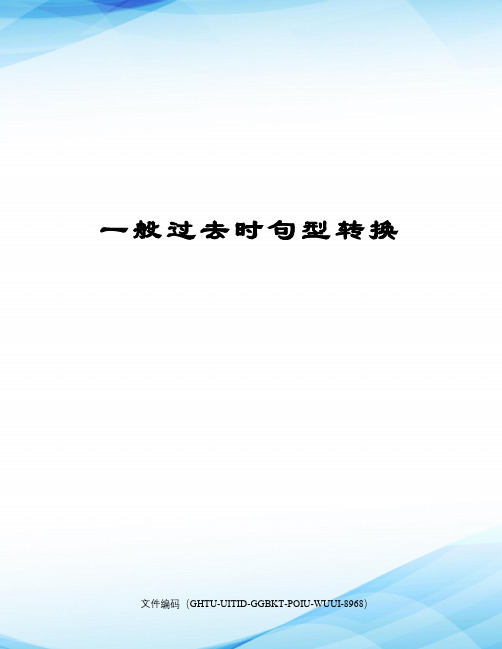
一般过去时句型转换文件编码(GHTU-UITID-GGBKT-POIU-WUUI-8968)句型转换例句:Mr.GreencookedalotoffoodonWednesday.Mr.Greendidn’tcookalotoffoodonWednesday.(改成否定句)DidMr.GreencookalotoffoodonWednesday?(改成一般疑问句)Yes,hedid.(肯定回答)No,hedidn’t.(否定回答)WhatdidMr.GreendoonWednesday?(对划线部分提问)1.Thechildrenplayedgamesinthepark.①②否定句:__________________________________________一般疑问句:________________________________________肯定回答:否定回答:_______________对划线部分提问:①____________________________________②2.Anndidherhomeworkyesterdayevening.①②否定句:__________________________________________一般疑问句:________________________________________肯定回答:否定回答:_______________对划线部分提问:①____________________________________②3.IreadanEnglishbooklastweek.否定句:__________________________________________一般疑问句:________________________________________肯定回答:否定回答:_______________对划线部分提问:____________________________________3.Shehadsomebreadforlunchtoday.①②否定句:__________________________________________一般疑问句:________________________________________ 肯定回答:否定回答:_______________对划线部分提问:①_______________________________②5.SuYangvisitedafarmtwodaysago.否定句:__________________________________________一般疑问句:________________________________________肯定回答:否定回答:_______________对划线部分提问:____________________________________。
一般过去时的几种句型

一般过去时的几种句型The final revision was on November 23, 2020人称代词用来代替表示人或事物的名词,以便不再重复使用名词。
1)人称代词的主格在句子中作主语用法举例:1.My name is Millie. I live in Beijing. ( I代自己, Millie )2. Sandy, do you know where Mr Wu is ( you代Sandy )3. Simon loves football. He is a member of the football team.4. Millie loves Eddie. She looks after him every day. (she 代 Millie)5. This book is very interesting. It is about cartoons. (it 代this book)6. I am Daniel and this is Amy. We are in Class 1, Grade7. (we 代替 Amy and I)2)人称代词的宾格在句子中作宾语(放在动词后面或者介词后面)me the answer, please.(动词后面)’s go.(=let us go) (动词后面)3. Look at him. He is funny! (介词后面)物主代词的定义:物主代词实际上是人称代词的所有格形式。
物主代词可以分为形容词性和名词性两种。
形容词性物主代词一定要后接名词(如:This is my book. 这是我的书。
),名词性物主代词可以独立使用,无需后接名词(如:This book is mine. 这本书是我的。
)。
3) 形容词性物主代词一般位于名词前,用作定语,限定该名词的意义This is my book.4) 名词性物主代词的句法功能a. 作主语,例如:May I use your pen Mine is broken.(mine=my pen)我可以用一用你的钢笔吗我的坏了。
一般过去时的用法和结构
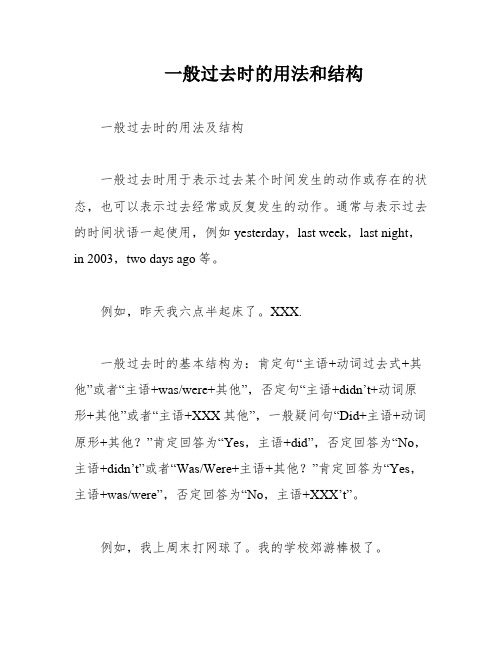
一般过去时的用法和结构一般过去时的用法及结构一般过去时用于表示过去某个时间发生的动作或存在的状态,也可以表示过去经常或反复发生的动作。
通常与表示过去的时间状语一起使用,例如yesterday,last week,last night,in 2003,two days ago等。
例如,昨天我六点半起床了。
XXX.一般过去时的基本结构为:肯定句“主语+动词过去式+其他”或者“主语+was/were+其他”,否定句“主语+didn’t+动词原形+其他”或者“主语+XXX其他”,一般疑问句“Did+主语+动词原形+其他?”肯定回答为“Yes,主语+did”,否定回答为“No,主语+didn’t”或者“Was/Were+主语+其他?”肯定回答为“Yes,主语+was/were”,否定回答为“No,主语+XXX’t”。
例如,我上周末打网球了。
我的学校郊游棒极了。
这个女孩昨天下午没玩电子游戏。
上星期五老XXX不高兴。
特殊疑问句的结构为:特殊疑问词+一般疑问句(顺序)?例如,XXX上周末干什么了?他去看了他的祖父母。
你昨天在哪儿?我在家里。
为了帮助记忆实义动词一般过去时的用法和结构,我们可以使用以下歌诀:“动词一般过去时,表示过去发生事。
谓语动词过去式,过去时间作标志。
否定形式很简单,主语之后加didn't。
谓语动词要还原。
疑问构成有规则,主语前面加did。
”过去式的构成有两种方式:be动词和实义动词。
系动词be的过去式有两种形式:was和were。
其中,was是am和is的过去式,were是are的过去式。
实义动词过去式的构成有以下几种规则:1.一般在动词末尾加-ed,例如walk→walked,play→played;2.以不发音e结尾的动词末尾只加-d,例如love→loved,decide→decided;3.以“辅音字母+y”结尾的动词,先将y变为i,再加-ed,例如study→studied,carry→carried;4.末尾只有一个辅音字母的重读闭音节,先双写该辅音字母,再加-ed,→ped,plan→planned。
(完整版)一般过去时句型转换
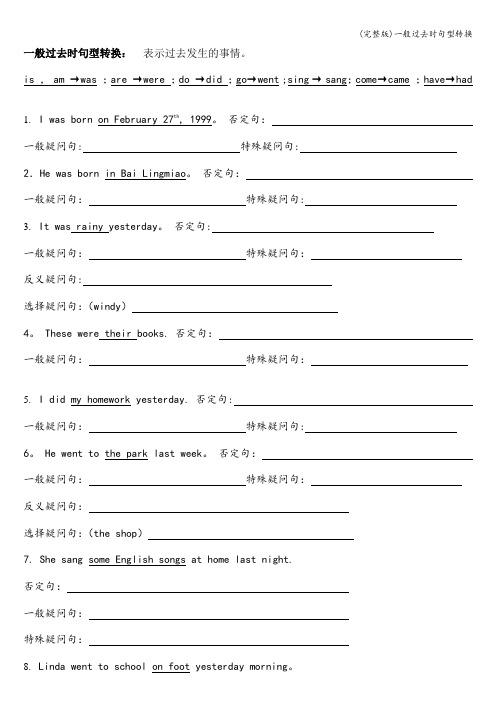
一般过去时句型转换:表示过去发生的事情。
is , am →was ;are →were ;do →did ;go→went ;sing → sang;come→came;have→had1.I was born on February 27th, 1999。
否定句:一般疑问句: 特殊疑问句:2.He was born in Bai Lingmiao。
否定句:一般疑问句:特殊疑问句:3.It was rainy yesterday。
否定句:一般疑问句:特殊疑问句:反义疑问句:选择疑问句:(windy)4。
These were their books. 否定句:一般疑问句:特殊疑问句:5.I did my homework yesterday. 否定句: 一般疑问句:特殊疑问句:6。
He went to the park last week。
否定句:一般疑问句:特殊疑问句:反义疑问句:选择疑问句:(the shop)7. She sang some English songs at home last night.否定句:一般疑问句:特殊疑问句:8.Linda went to school on foot yesterday morning。
否定句:一般疑问句:特殊疑问句:反义疑问句:选择疑问句:(by bike)9.They lived in a big house 10 years ago. 否定句: 一般疑问句:特殊疑问句:10.The twins liked swimming last year. 否定句: 一般疑问句:特殊疑问句:反义疑问句:选择疑问句:(running)11.There used to be lots of flowers in the garden years ago.否定句:一般疑问句:特殊疑问句:。
一般过去时的用法

般过去时的用法一般过去时表示过去某个时间发生的动作或存在的状态,也表示过去经常或反复发生的动作。
谓语动词要用动词的过去式,常和表示过去的时间状语连用,女口:yesterday 昨天,last night 昨晚,last week 上周,last year 去年等。
一.一般过去时的结构(可分两类不同的结构)1. Be 动词的一般过去时在没有实义动词的句子中使用be 动词,am/is 的过去式为was ;are 的过去式were。
肯定句式:主语+be (was/were) + 其他.否定句式:主语+be (was/were) +not + 其他. 一般疑问句:Be (was/ were) + 主语+其他。
2. 实义动词的一般过去时态肯定句要使用动词的过去式,否定句和疑问句要使用助动词do/does 的过去式did.肯定句式:主语+动词(过去式)+ 其他。
否定句式:主语+ didn 't +动词(原形)+其他(did not= didn 't)一般疑问句:Did +主语+动词(原形)+ 其他(do, does 的过去式均为did)? 注: 1.did 和didn 't 是构成一般过去时的助动词,其特点是要在其后跟动词的原形。
2. 实义动词do 的一般过去时,例:Jim went home yesterday. --- Jim didn ' t go home yesterday.(否定句)--- Did Jim go home yesterday?(一般疑问句)--- What did Jim do yesterday?(特殊疑问句)二.一般过去时的判断标志词:yesterday,the day before yesterday,last+ 时间,this morning, 时间+ago,just now,a moment ago,in+ 过去的时间注意:一般过去时表示过去经常或反复发生的动作,常和often 经常,always ,总是,once a week 一周一次,等表示频度的时间状语连用动词过去式变化规则:1. 一般在动词末尾加ed, 如:pull--pulled, cook--cooked, play--played2. 结尾是e 力口d,女口: taste--tasted, live--lived, use--used3. 末尾是辅音字母加一个元音字母的重读闭音节,应双写末尾的辅音字母,再力口ed,女口:stop-stopped, plan--planned4. 以“辅音字母+y ”结尾的,变y为i,再加ed,如:study-studied5. 不规则动词过去式:(见课后)过去时练习选择( ) 1.What __________ they ____________ dinner yesterday?D.wanted; buyA.do; have forB.did; had for;C. LeavedD.was leaving( )2.Could you tell me what time _______________ t he plane?A.leftB.leavesC.leavedD.left( )3.One of us ______________ band last month.A. leavesB. leaveC.leavedD. left( )4.Where _______________ your mother born?A.areB. wasC.wereD.is ( )5.Do you know why he _______________ for class last year?A.was always lateB.always was lateC.is late alwaysD.is always late( )6.I got up _______________ this morning. So I ________ breakfast and went to school.te, didn 't haveB. Early, didn 't havete, hadn ' tD.early, hadn 't( )7.It ______________ much cold today than it ___________ yesterday.A.is, isB.was, wasC.is, wasD.was, is ( )8.He didn ' t come __________ goodbye to us and ________ away.A.say,goB.say, wentC.to say, wentD.to say, go( )9.Her pen was broken.She ________ to _______ a new one.A.wants, buysB.wanted, boughtC.wants,bought ( )10.I thought the dress ________ really pretty.A.isB. wasC./D.were( )11.I ______________ tired now, but it __________ an exciting day.A.am, wasB.was,wasC.was,isD.am,is( )12.He said he ____________ go to cook dinner for us.A.willB.wouldC./D.doesn ' t( )13.I stayed in the sitting room and _________ my friends all the time.A.talk toB.talkedC.talk aboutD.talked to( )14.She also __________ her _____ in a 1990s style.A.weared;hairB.wore;hairC.wear;hairD.wears;hairs( )15.I went to see you last Saturday, ________ t here _____ nobody inthe room.A. but;wasB.and;wereC.and;wasD.but;is二、用所给词的适当形式填空1. He put the books away and ________ (go)home.2. The boy is running and ________ (tie)his shoes on the playground.3. My father ________ (buy) a new computer for _________ (I)yesterday.4. He often ___________ (go)to school by bike,but last year heoften ___ (walk)to school.5. After she finished _________ (pack )everything,she ______________ (go)to school.6. ----Who ____ (wash)the plates on the table?----Jenny did.7. ----When ___ you _____ (see)the film “ Titanic ” ?8. It' s half past eleven now.Jim ____ (have)lunch.He usually ____ (have)itat this time.9. She _______ (write)to Jill last month.She __________ (write) to him nexttime.10. The students _____ (stop)talking when their teacher came up.三、句型转换1. The children had a good time in the park.否定句:____________________________________________________一般疑问句:________________________________________________________对划线部分提问:________________________________________________________ 2. There were about nine hundred people at the concert.( _____ 音乐会)对划线部分提问:________________________________________________________ 一般疑问句:________________________________________________________否定句:____________________________________________________3. There was only one problem.否定句:____________________________________________________一般疑问句:________________________________________________________肯定/否定回答:_________________________________________________________ 4. A nn did her homework yesterday eve ning.否定句:____________________________________________________一般疑问句:________________________________________________________对划线部分提问:________________________________________________________ 5. Last week I read an English book.否定句:____________________________________________________一般疑问句:________________________________________________________肯定/否定回答:_________________________________________________________ 对划线部分提问:________________________________________________________2. Frank read an interesting book about history._________ Frank ___________ an in terest ing book about history?3. He' s cleaning his rooms.____________ he ________________ ?4. Why not go out for a walk?__________ _________ __________ ___________ out for a walk? 5. Thomas spent RMB 10 on this book.Thomas __________ __________ RMB 10 on this book.6. My family went to the beach last week.___________ ___________ ___________ family ________ last week?7.I didn ' t have any friends.___________ __________ have ___________ friends?8.I think she is Lily 's sister.9. Sally often does some reading in the morning.Sally _________ often _________ some reading in the morning.10.He is a tall boy._________ _________ he __________ __________ ?六.翻译下列句子1.我过了一个忙碌却又刺激的周末。
时态三、一般过去时
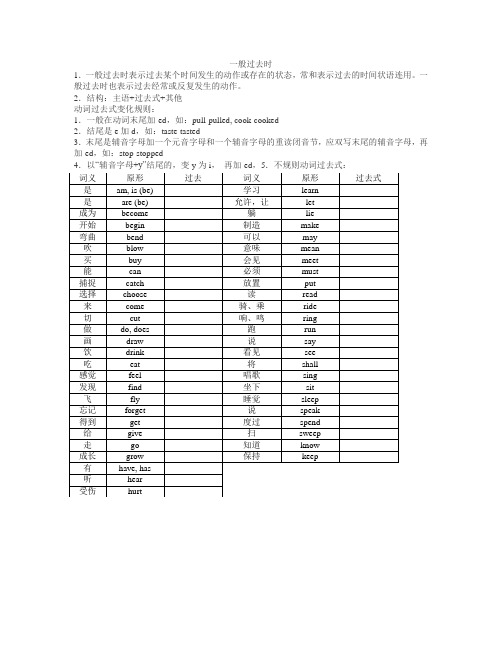
一般过去时1.一般过去时表示过去某个时间发生的动作或存在的状态,常和表示过去的时间状语连用。
一般过去时也表示过去经常或反复发生的动作。
2.结构:主语+过去式+其他动词过去式变化规则:1.一般在动词末尾加-ed,如:pull-pulled, cook-cooked2.结尾是e加d,如:taste-tasted3.末尾是辅音字母加一个元音字母和一个辅音字母的重读闭音节,应双写末尾的辅音字母,再加-ed,如:stop-stopped4.以“辅音字母+y”结尾的,变y为i,再加-ed,5.不规则动词过去式:三、句型转换:一般过去式看动词,动词必须用过去式,变一般疑问句先找be 和情态动词,若有提前并大写,若无借助于did,实义动词要还原。
变否定句先找be 和情态动词,若有再后加not,若无借助于didn’t,实义动词要还原。
特殊疑问句由疑问词+一般疑问句构成。
四、标志词:1. yesterday、last+时间、时间+ago、just now、in+过去的时间一、单项选择:从下列各题后所给的四个选项中选择最佳答案填空。
(10)( )1.My father______ill yesterday.A.isn't B.aren't C.wasn't D.weren't( )2.______your parents at home last week﹖A.Is B.Was C.Are D.Were( )3.The twins______in Dalian last year.They______here now.A.are; were B.were; are C.was; are D.were; was ( )4.______your father at work the day_____yesterday(前天)﹖A.Was; before B.Is; before C.Was; after D.Is; after ( )5.—Who was on duty last Friday﹖—______.A.I am B.I was C.Y es, I was D.No, I wasn't ( )6. I cleaned my classroom ___________.A with three hoursB three hours agoC in three hoursD three hours before( ) 7. I came _______ my house two days ago .A back onB back toC to backD back( ) 8 . ___________? He did some reading at home.A What does your father do yesterday eveningB What does your brother do in the schoolC What did your brother do over the weekendD Where did your brother go last Sunday( ) 9. What did you do ________ ? I went to the movies.A next morning Bover the weekend C in the weekend D next Monday( ) 10. The koala sleeps _______,but gets up _________.A during the day; at the eveningB at day ;during nightC in the day ;during the eveningD during the day ; at night二、请用正确动词形式填空。
【单元热点难点】译林版(三起)英语六年级上册Unit 3 Holiday fun 语法重点(含解析)
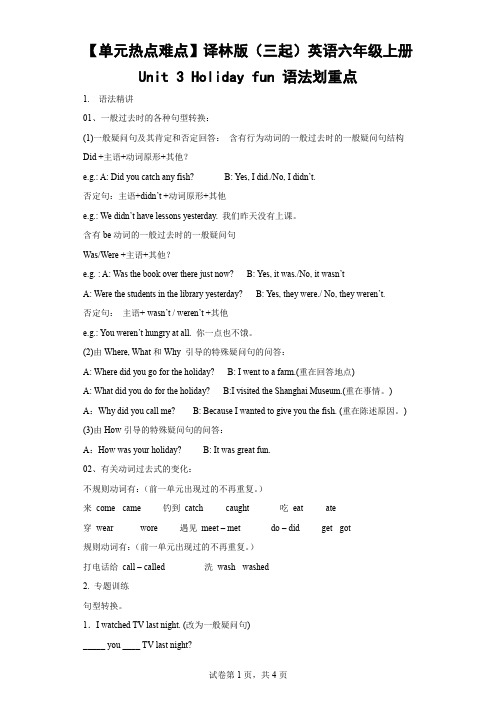
【单元热点难点】译林版(三起)英语六年级上册Unit 3 Holiday fun 语法划重点1. 语法精讲01、一般过去时的各种句型转换:(1)一般疑问句及其肯定和否定回答:含有行为动词的一般过去时的一般疑问句结构Did +主语+动词原形+其他?e.g.: A: Did you catch any fish? B: Yes, I did./No, I didn’t.否定句:主语+didn’t +动词原形+其他e.g.: We didn’t have lessons yesterday. 我们昨天没有上课。
含有be动词的一般过去时的一般疑问句Was/Were +主语+其他?e.g. : A: Was the book over there just now? B: Yes, it was./No, it wasn’tA: Were the students in the library yesterday? B: Yes, they were./ No, they weren’t.否定句:主语+ wasn’t / weren’t +其他e.g.: You weren’t hungry at all. 你一点也不饿。
(2)由Where, What和Why 引导的特殊疑问句的问答:A: Where did you go for the holiday? B: I went to a farm.(重在回答地点)A: What did you do for the holiday? B:I visited the Shanghai Museum.(重在事情。
)A:Why did you call me? B: Because I wanted to give you the fish. (重在陈述原因。
)(3)由How引导的特殊疑问句的问答:A:How was your holiday? B: It was great fun.02、有关动词过去式的变化:不规则动词有:(前一单元出现过的不再重复。
2025届高考英语语法复习一般过去时知识讲解讲义
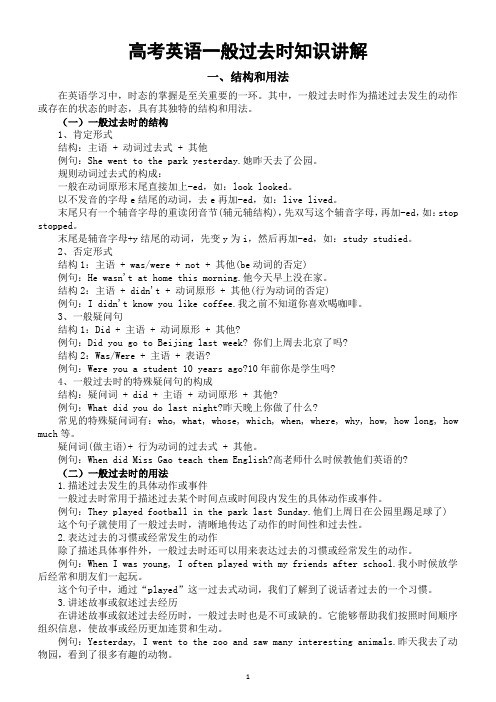
高考英语一般过去时知识讲解一、结构和用法在英语学习中,时态的掌握是至关重要的一环。
其中,一般过去时作为描述过去发生的动作或存在的状态的时态,具有其独特的结构和用法。
(一)一般过去时的结构1、肯定形式结构:主语 + 动词过去式 + 其他例句:She went to the park yesterday.她昨天去了公园。
规则动词过去式的构成:一般在动词原形末尾直接加上-ed,如:look looked。
以不发音的字母e结尾的动词,去e再加-ed,如:live lived。
末尾只有一个辅音字母的重读闭音节(辅元辅结构),先双写这个辅音字母,再加-ed,如:stop stopped。
末尾是辅音字母+y结尾的动词,先变y为i,然后再加-ed,如:study studied。
2、否定形式结构1:主语 + was/were + not + 其他(be动词的否定)例句:He wasn't at home this morning.他今天早上没在家。
结构2:主语 + didn't + 动词原形 + 其他(行为动词的否定)例句:I didn't know you like coffee.我之前不知道你喜欢喝咖啡。
3、一般疑问句结构1:Did + 主语 + 动词原形 + 其他?例句:Did you go to Beijing last week? 你们上周去北京了吗?结构2:Was/Were + 主语 + 表语?例句:Were you a student 10 years ago?10年前你是学生吗?4、一般过去时的特殊疑问句的构成结构:疑问词 + did + 主语 + 动词原形 + 其他?例句:What did you do last night?昨天晚上你做了什么?常见的特殊疑问词有:who, what, whose, which, when, where, why, how, how long, how much等。
- 1、下载文档前请自行甄别文档内容的完整性,平台不提供额外的编辑、内容补充、找答案等附加服务。
- 2、"仅部分预览"的文档,不可在线预览部分如存在完整性等问题,可反馈申请退款(可完整预览的文档不适用该条件!)。
- 3、如文档侵犯您的权益,请联系客服反馈,我们会尽快为您处理(人工客服工作时间:9:00-18:30)。
一般过去时句型转换 Jenny was compiled in January 2021
句型转换
例句:Mr.GreencookedalotoffoodonWednesday.
Mr.Greendidn’tcookalotoffoodonWednesday.(改成否定句)
DidMr.GreencookalotoffoodonWednesday(改成一般疑问句)
Yes,hedid.(肯定回答)No,hedidn’t.(否定回答)
WhatdidMr.GreendoonWednesday?(对划线部分提问)
1.Thechildrenplayedgamesinthepark.
①②否定句:__________________________________________一般疑问句:________________________________________
肯定回答:否定回答:_______________
对划线部分提问:①____________________________________
②
2.Anndidherhomeworkyesterdayevening.
①②否定句:__________________________________________一般疑问句:
________________________________________
肯定回答:否定回答:_______________
对划线部分提问:①____________________________________
②
3.IreadanEnglishbooklastweek.
否定句:__________________________________________
一般疑问句:________________________________________
肯定回答:否定回答:_______________对划线部分提问:
____________________________________
3.Shehadsomebreadforlunchtoday.
①②
否定句:__________________________________________
一般疑问句:________________________________________ 肯定回答:否定回答:_______________
对划线部分提问:①_______________________________
②
5.SuYangvisitedafarmtwodaysago.
否定句:__________________________________________
一般疑问句:________________________________________
肯定回答:否定回答:_______________
对划线部分提问:____________________________________。
